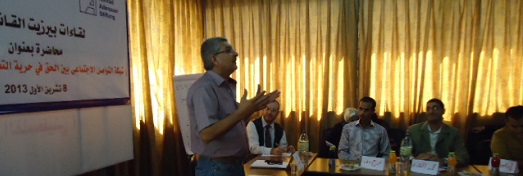Social Media between Freedom of Expression and Right of Privacy
In the presentation, Advocate Fat’hi Sabbah highlighted theoretical and practical dimensions of social media, including Facebook, Twitter, Instagram, etc. These platforms provide a modern social media channel, ensuring that citizens enjoy the freedom of expression. The Palestinian Basic Law provides a general constitutional norm that safeguards freedom of expression. However, the Palestinian legal framework has so far lacked a specific law for regulation of social media activity. The Law on Printed Materials and Publication of 1995 was promulgated hastily to organise various media outlets. It does not take account of increasingly rapid developments in the media sector. The Law provides that materials in conflict with the principles of freedom, national responsibility and human rights may not be published. This is, in fact, a loose criterion, which can entail an expansive list of prohibitions that restrict freedom of expression.
Advocate Sabbah explained that several laws have been passed enforced in the Gaza Strip after the Palestinian internal political division. Still, a law on social media has not been issued. Developed in Gaza, the Draft Media Law includes several controversial provisions, which impede freedom of expression. Examples include Articles 7 and 20 of the draft law.
In the ensuing discussion, participants made several comments and recommendations. To protect, rather than restrict, public freedoms, the relation between freedom of expression and right of privacy in social media should be subject to legal regulation. Relevant legislation, most notably the 1995 Law on Printed Materials and Publication, should also be amended.
The legal encounter was organised with support from Konrad Adenauer Stiftung.











